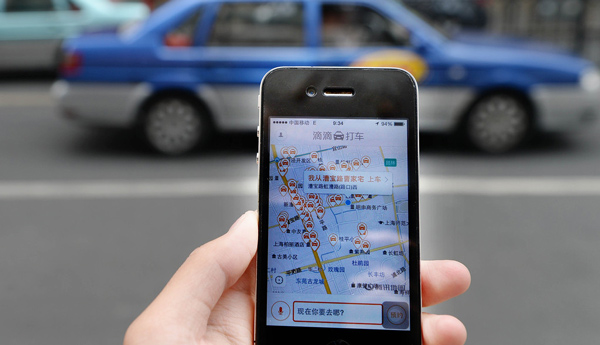 |
|
A Chinese mobile phone user uses the taxi-hailing app Didi Dache backed by Tencent on his smartphone in Shanghai, Oct 16, 2014. [Photo/IC] |
Jessica Yang switched from taxis to chauffeured cars for the commute into her Beijing office as rides have become cheaper. These days, she often goes for free, because apps such as Uber Technologies Inc offer big incentives to win customers.
"I just go for whatever is cheaper," said Yang, 41, who does not drive and has taken free rides offered by Uber and local rival Didi Kuaidi. "There is no loyalty here. Almost all the cars are better than Beijing's smelly taxis."
Uber and the clones it spawned are widely considered the next big thing for the technology industry, with venture capital and hedge funds lining up to bet on their prospects. In China, the race to win over hundreds of millions of paying commuters has pushed companies to put market share before profitability, behavior common during the dot-com bubble that peaked in 2000.
"The new round of price wars is about to start, and it'll be a war of attrition," said Zhang Xu, a Beijing-based analyst at Analysys International, which advises Internet companies.
"Unlike previous price wars, where they were mainly attracting new users, they now need to fight to grab each other's users. They'll need to have enough capital so that they can last."
There has been no lack of willing backers in China's ride-hailing competition.
The company operating the Didi and Kuaidi apps is seeking to raise at least $1.5 billion to fend off Uber in China, with funding coming from new and old investors, people familiar with the matter said this week.
Backed by Alibaba Group Holding Ltd and Tencent Holdings Ltd, Didi Kuaidi announced earlier it would give away 1 billion yuan ($161 million) worth of rides to commuters to compete against Uber and Yidao Yongche, which also operates in the estimated $1 trillion-a-year market for transportation services in the world's most populous country.
Didi Kuaidi dominates China's car-hailing market with 78 percent of ride bookings, while Uber has about 11 percent, according to Analysys.
Uber plans to invest more than $1 billion in China this year alone, according to a letter to investors from Chief Executive Officer Travis Kalanick. Riders are completing almost 1 million trips a day in China, doubling in the past month.
Internet companies are "burning the cash" to build scale for taxi-hailing, and now private-car booking, because they are among the most frequently used services in daily life and can drive usage of their other products, such as mobile payment, said Wendy Huang, the Hong Kong-based head of Asia Internet and media for Macquarie Bank Ltd.
